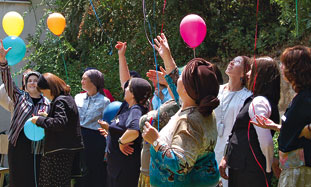Source: Jerusalem Post
Date: July 2, 2010
Byline: Ruth Beloff
Angels Among Us: Making it through the maze
With its motto "Growth within support," Beit Natan strives to help women with cancer navigate the health system.
- Name: Chaya Heller
- Organization: Beit Natan, Women’s Cancer Support and Resource Center
- Position: Founder
- Mission statement: To support and encourage women and their families coping with cancer
- Address: 48 Rehov Bayit Vagan
- Info: 644-6052; 643-3447; beitnatan.org

The Beit Natan Women’s Cancer Support and Resource Center was established in 1997 to fill a need. But, says Chaya Heller, the founder of the nonprofit organization, “I should go out of business as soon as possible.”
Headquartered in what Heller describes as a beautiful old house in Bayit Vagan, Beit Natan guides women through the maze of the cancer experience. “We don’t offer medical advice and we are not an advocacy organization,” she explains, “but we hold their hands and walk them through.”
Beit Natan provides help to women with all types of cancer; but because breast cancer is so prevalent, says Heller, it is the main focus. In particular, early detection of the disease. The majority of the clientele are religious. “We are trusted in the haredi community,” says the 57-year-old wife and mother of five daughters and grandmother of three.
The impetus to establish the organization was spurred by the loss of a friend to cancer, Heller recounts. Her friend was a new immigrant who had no family in Israel. When the woman was diagnosed with late-stage breast cancer, Heller organized a fund-raiser for her, and she rallied friends and neighbors round the clock to keep her company at home and in the hospital. “I saw a need in my friend’s need,” recalls the former Montrealer who made aliya in 1980.
The lightbulb moment to take it a step further came when one of the nurses at the hospital asked, “Why are haredi women coming at the late stages of breast cancer?”
Heller began investigating the issue. “I went to the Israel Cancer Association, and they gave me the seed money to do outreach,” she says. Heller began to provide lectures on breast cancer awareness and early detection.
Then she set up her nonprofit. Heller named the organization for her grandfather, Natan, who had also succumbed to cancer. The name also denotes “giving” and “receiving,” she points out. The organization receives grants from the UJA, as well as funding from the Boston-based Healing over the Divide and Komen for the Cure, a breast cancer advocacy foundation in Texas.
“We try to be there for everybody and cater to their needs,” says Heller. With a dedicated staff of 10 part-time workers and a team of some 200 volunteers, Beit Natan offers a variety of hands-on services. These include seminars, support groups, a hotline, a home hospice visitation program and vacation get-aways in the North. These are all characterized by an aura of wellness, bonding and a feeling of friendliness, says Heller.
With its motto “Growth within support,” Beit Natan strives to help women not only navigate the cancer situation but, it is hoped, sail through it. In the support groups, for example, Heller says that through interaction and the sharing of their experiences, women learn how to listen and to differentiate their own situation and thereby develop genuine concern for others. “To give and to receive helps everybody,” says Heller, who has a degree in family therapy.
On a more one-on-one basis, the hot line is manned by professional caregivers, as well as recovered cancer patients who have been trained to help callers face their challenges. Each caller is matched with a hot line responder who can offer the type of support she needs.
For patients who are facing end-of-life issues, the home hospice visitation program comprises volunteers who go to their houses and spend time with them. Be it to aid a person who is alone or to offer respite for the other family members, the trained volunteer is there to offer the patient comfort and support. These clients are referred to Beit Natan by the various health funds.
A very pleasant form of respite for the patient is the vacation retreat, which is designed to provide an enjoyable and therapeutic time away from home or the hospital. Here, a mixed group of religious and non-religious women spend two to three days in the North. There are lectures, support groups and fun activities during the day, as well as a party at night where participants have the opportunity to sing and dance.
“At the retreats, we see amazing things going on,” says Heller. She cites the example of a 26-year-old woman from Bnei Brak who insisted that her husband accompany her on the all-woman retreat. “Okay. No problem,” Heller responded. There was a lot of anxiety because of the cancer, Heller explains, and it was creating a lot of tension in the relationship.
One of the participants on the trip, she continues, a 55-year-old Sephardi woman, had the same type of cancer as the younger woman. She went over to the couple and said to them, “This disease made my relationship with my husband. You have to be there for each other.”
As Heller recounts, the young woman loosened up and attended all the meetings and events at the retreat. At the closing party the husband, who had gotten out of bed after midnight to look for his wife, found her there, singing and dancing.
“One person says something that helps the other. It is the work of the angels. That’s what keeps us going,” says Heller.
And projecting ahead into the fall, she notes that October is breast cancer month. “Awareness goes a long way. With early detection, you can work your way through it and live.”

